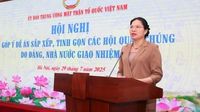On the afternoon of July 29, 2025, a significant meeting convened in Hanoi to discuss the Project aimed at streamlining and reorganizing mass organizations assigned tasks by the Party and State. This gathering was chaired by Ms. Ha Thi Nga, a Member of the Party Central Committee and Vice President of the Central Committee of the Vietnam Fatherland Front. Attendees included prominent figures such as Ms. Nguyen Thuy Anh, representatives from various Party committees including Propaganda, Mass Mobilization, and the Central Office, officials from the Ministry of Home Affairs, related ministries, leaders from local Vietnam Fatherland Front Committees, and representatives from 30 mass organizations.
Over recent years, the Vietnamese Party and State have issued numerous directives and resolutions to consolidate and streamline the political system, focusing on creating a more effective and efficient governance structure. Among these, Resolution No. 18-NQ/TW dated October 25, 2017, by the 12th Party Central Committee, explicitly called for reviewing and reorganizing associations and federations. It emphasized addressing the proliferation of unnecessary or ineffective organizations and progressively ceasing state budget funding for those that fail to deliver meaningful impact.
Further reinforcing this direction, Politburo Conclusions No. 174-KL/TW (July 4, 2025), No. 177-KL/TW (July 11, 2025), and No. 178-KL/TW (July 17, 2025) have all underscored the necessity to continue consolidating administrative units at district and commune levels. These conclusions tasked the Party committees of the Vietnam Fatherland Front and central mass organizations with the responsibility to rigorously review and streamline mass organizations under their charge. The objective is clear: to reduce the number of organizations, simplify internal structures, eliminate redundant intermediary layers, and enhance practical effectiveness and operational efficiency.
This comprehensive reform aligns with Vietnam’s ambitious vision to build a digital government and digital society, aiming to become a stable and prosperous digital nation by 2030. Achieving this requires every component of the political system—including mass organizations—to restructure, streamline, and boost their operational output. The Project to reorganize these mass organizations is a concrete step towards realizing these goals, ensuring consistency with broader reforms ongoing within the Party and State apparatus from central to grassroots levels.
At the meeting, the discussions delved deeply into the guiding viewpoints, principles, and criteria for reorganizing mass organizations. The Project is founded on four overarching viewpoints, five fundamental principles, and six specific criteria. These criteria include the necessity of the organization based on the country’s strategic development, the extent of overlap in functions and target groups, the scale and scope of influence, the degree of financial and human resource autonomy, historical factors, international commitments, and the unique characteristics of the mass groups served.
One of the critical policy frameworks referenced during the meeting was Politburo Conclusion No. 102-KL/TW dated September 22, 2014, which stipulates that only associations with genuine necessity and wide-reaching, practical social impact should be organized and assigned tasks. This principle guides the ongoing efforts to ensure that mass organizations are not only efficient but also relevant and impactful in their missions.
The 11th Central Committee Meeting of the 13th Party term had earlier agreed on the policy to reorganize, streamline, and merge the apparatus of the Vietnam Fatherland Front, political-social organizations, and mass organizations assigned tasks by the Party and State. Under this framework, the 30 mass organizations will be reorganized to operate directly under the Central Committee of the Vietnam Fatherland Front. This restructuring aims to reduce redundant administrative layers, avoid overlapping roles and functions, and significantly boost the effectiveness of their operations.
Throughout the meeting, representatives also examined various organizational models post-restructuring, changes in management and operational approaches compared to previous periods, and the challenges and obstacles anticipated during implementation. Many practical solutions and strategies were proposed to ensure the Project’s success and the smooth transition to the new organizational framework.
Ms. Ha Thi Nga highlighted the importance of this meeting as a platform to foster democratic dialogue, gather intellectual contributions, and listen to heartfelt, responsible opinions to perfect the Project. She emphasized that the Project is designed to reduce redundant entities, streamline organizations, and innovate operational methods, balancing inheritance and stability with breakthrough development and practical effectiveness.
Ms. Ha Thi Nga also outlined the Project’s foundation on four guiding viewpoints, five principles, and six criteria, which provide a clear framework for evaluating and restructuring the organizations. She called on participants to contribute candid, objective, and responsible feedback and practical solutions to ensure the Project becomes a powerful step forward in enhancing the role and efficiency of mass organizations within the political system.
Moreover, she assured that the Standing Committee of the Central Committee of the Vietnam Fatherland Front would continue to refine the Project, incorporating the valuable feedback from the meeting and other experts, scientists, and leaders of the mass organizations. The finalized Project is scheduled to be submitted to the Politburo for consideration and decision before August 31, 2025.
Once approved, this reorganization will pave the way for mass organizations to operate more effectively and assertively, playing a stronger role in implementing the Party’s major policies and the State’s laws. It will also contribute to strengthening the great national unity bloc during this new stage of development, supporting the country’s stride into the digital era with a more streamlined, efficient, and responsive political apparatus.
In sum, the Project to streamline and reorganize mass organizations is not merely a bureaucratic exercise but a vital reform step. It reflects Vietnam’s commitment to modernizing its political system, aligning with the digital transformation agenda, and ensuring that all components of governance are fit for the challenges and opportunities of the future. As the deadline for submission to the Politburo approaches, the momentum and consensus generated at the meeting signify a shared determination to realize these reforms for the benefit of the nation and its people.

